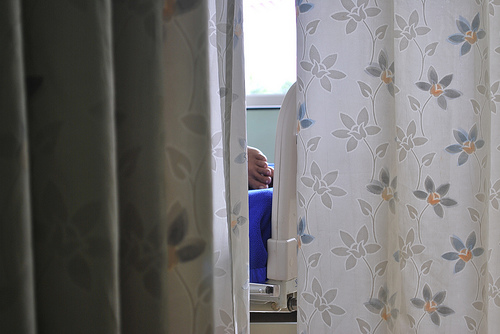My brother and I take a deep breath before pushing open the door to our mother’s room in the intensive care unit at Mass General Hospital at 6:00 a.m. after a brief, fitful sleep on the red-eye flight from Denver.
Her kidneys have failed, victims of 14 years of ravaging cancer, yet IVs and miracles have postponed her inevitable death, in blatant disregard for the fact that her time had come—yesterday. Her bleary eyes brighten slightly at our arrival as she wearily tilts her head to view the only tangible accomplishments of her life.
“Hi there,” she squeaks, her voice weak, her head still foggy from poisons that seeped into her bloodstream when her kidneys were on strike. I sit next to her, sweeping my eyes around the scene of tubes, medicine bags, blinking monitors and nurse notes scribbled on a clipboard at the foot of the bed. It smells of death and flesh rot and bodily fluids.
“How are you feeling, Mom?” I ask. I can’t decipher the mumbles from her mouth, but I can tell she has something important to say by the earnest look in her eye.
“What’s that, Mom?”
“Do you forgive me?” she asks. The delirium has given her permission to dig into painful hollows that have been taboo until now.
“For what,” I whispered back, afraid of speaking too loudly lest someone overhear our tightly kept secrets.
“For the drinking,” she breathes out in a drawn-out whisper, as if letting go of guilt that has haunted the depths of her soul for years.
What can I say?
My mind wanders to memories of my youth—how she had to be home by six o’clock to “watch the news.” It wasn’t the news that waited, but her cocktail.
She’d dig into a couple of aperitifs before plowing though a gallon jug of wine—the cheap variety grabbed in haste from the bottom shelf of a no-frills liquor store. By the wee hours, she’d be a sloppy mess, dialing telephone numbers, then slurring sadness into the receiver regardless of who was listening—or not, often my father, whose eyes rolled at the pathetic ramblings crackling over the wire all the way to his home in Australia.
Eventually she’d hang up, or fall off the stool and pass out on the filthy kitchen floor, leaving the receiver dangling from the wall. Sometimes she’d stumble up the creaky stairs to my room and perch on the edge of my bed, the sickly sweet smell of alcohol wafting from her mouth and swirling around my sleep. She’d sob and clutch me, as if I were the only reason to keep living.
It was too heavy a weight to bear. I was just a young child, six years old.
Drinking consumed her hours with voracious hunger, like a whale shark scooping giant swallows of plankton. My mother couldn’t get anything done. Newspapers piled on couches. Bills sat idly on counters, their envelopes still sealed. The Christmas tree lingered through spring, dusty ornaments fading from prolonged exposure. No one came for dinner. No one even came over. Or called.
She was the strange lady in the corner house who stayed up until 4:00 a.m., then slept until late afternoon, leaving little time for neighborly chats over white-picket fences.
I look at my mother in the hospital bed—her matted hair, eyeglasses slipped down on her sweaty nose, sallow skin—and for a moment I feel sorry for her, for all of her years of suffering with cancer, for her empty life.
But then my memory jerks me back to childhood hell—the night we went to a special dinner at a medieval restaurant. After guzzling goblet after goblet of wine, she took me on a terrifying drive home. Crumpled in a ball of terror in the passenger seat, I squeezed my eyes closed each time the speeding car launched over the rails of a subway crossing. By now I was eight, shell-shocked at the mercy of a pickled pilot.
The wheels screeched to a halt on our gravel driveway. I had to prop up my mother as she stumbled up the stairs to the back door, her legs buckling from the effort. She fumbled for her key in her giant purse that overflowed with cigarette packs, crumpled receipts, empty notepads and other detritus of an unkempt life.
After a few drunken trawls, she gave up and collapsed in a heap on the stoop, bawling over some mysterious sorrow. The night was dark and heavy, thick with humid summer air that carried our voices through the window next door. The neighbor heard and came to help, opening the door and carrying my mother to bed.
I am filled with shame. I just want to be normal like everyone else. I am afraid to feel. It’s too painful.
This episode and a thousand more shape my adult psyche. I am the parent. I can’t rely on anyone. If I need something done, I need to do it myself. Put on a happy face and don’t let the neighbors know. And never reveal true feelings—you might get hurt. Or someone might not like you. Or they’ll think I’m her.
They think I’m just like her.
At some point in my early 20s, I realized I could prove I’m not her. I subconsciously vowed to be perfect. Perfect work and perfect meals and a perfect Christmas tree and perfectly wrapped presents and perfect organization and never late and so on, and so on, and so on, and so on.
It was exhausting and made me anxious. I was afraid to let people see the real me for fear they wouldn’t like what they see. It took decades and her death for me to wake from this haze and remove the shackles from my heart.
She gave me so much, yet not what I needed most—safety. Her presence injected chaos into my tightly ordered brain, which now tidies things and wraps them in neat bundles to avoid feeling out of control.
In the hospital room, I’m still a wounded little girl, afraid to say how I really feel. I reach out, take my mother’s hand and look into her eyes.
“Yes, Mom, I forgive you.”
Love elephant and want to go steady?
Sign up for our (curated) daily and weekly newsletters!
Editor: Catherine Monkman
Photo: Flickr











Read 5 comments and reply